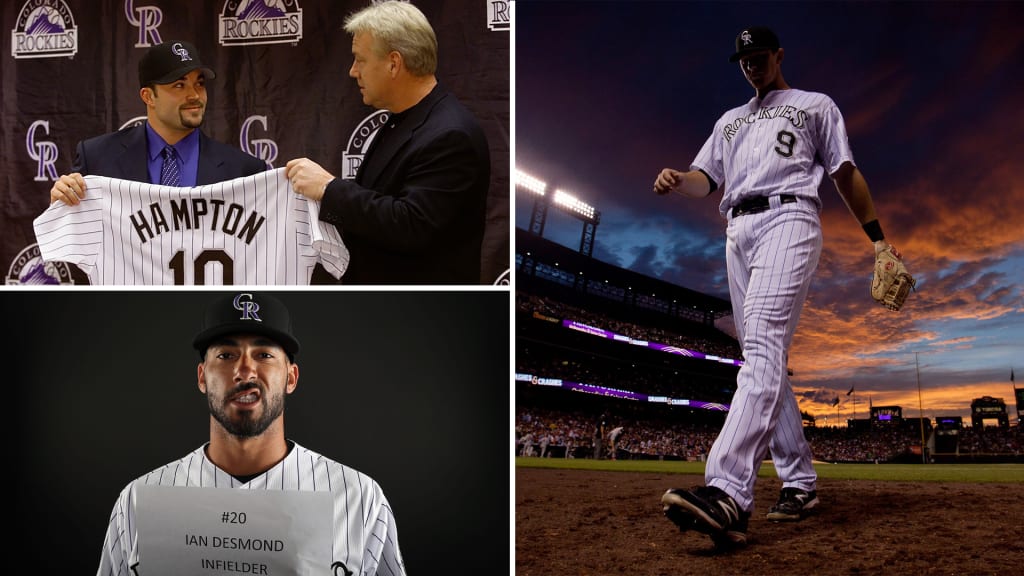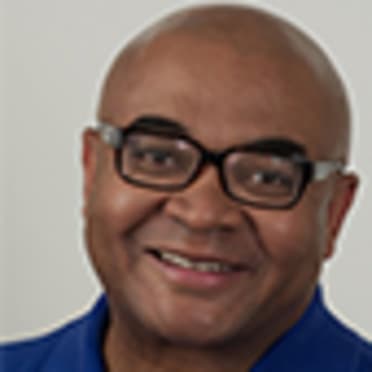
DENVER -- The Rockies’ biggest Winter Meetings move was nowhere near successful. But it tops this list for its shock and lasting impact.
1) Signed Mike Hampton for eight years, $121 million (2000)
Baseball and business collided in the most spectacular of fashions. After leading the Majors in attendance from the expansion 1993 season through '99, Rockies ownership wanted to prevent a decline that was inevitable, as the team was coming upon hard competitive times.
The Rockies also were fighting the notion that effective pitching was not possible at altitude -- a thought that gained steam after righty Darryl Kile went 21-30 with a 5.84 ERA from 1998-99 before being traded to the Cardinals and promptly going 20-9 with a 3.91 ERA in 2000.
The team went 82-80 in 2000, the first year with Dan O’Dowd as general manager, but ownership pushed for a quicker rebound. So the Rockies swung big. In days leading up to the Winter Meetings, Colorado signed lefty Denny Neagle for five years and $51.5 million. The stage was set for an even bigger lefty signing. The Rockies even invited shortstop Alex Rodriguez to Denver, where royalty -- former Broncos quarterback John Elway -- hosted a dinner.
The Hampton signing blew minds. The original announcement put the deal at $123.8 million, but the Associated Press discovered that figure was based on an interest payment that wasn’t included in other contract values. The Rockies ended their pursuit of A-Rod, who landed with the Rangers for 10 years and $252 million.
Hampton was named to the 2001 National League All-Star team, but he declined quickly and was 21-28 with a 5.75 ERA in 62 starts before being dealt to the Braves in a three-way deal after the '02 season. Neagle went 19-23 with a 5.57 ERA in three seasons before being released and not returning to the Majors.
What did it teach the Rockies? They began storing baseballs in an atmosphere-controlled chamber, or “humidor,” to keep them from shrinking and becoming hard and slick. Staying away from top free-agent pitchers since, much of their success has come from system products or pitchers traded for before they became established Major Leaguers.
2) Acquired DJ LeMahieu from the Cubs (2011)
This one broke as the Rockies contingent’s return trip was headed back to Denver International Airport, but let’s count it as a Winter Meetings deal, anyhow.
The Rockies received LeMahieu, a rangy infielder with an uncanny ability to make contact, and outfielder Tyler Colvin for third baseman Ian Stewart, a former first-round pick who couldn’t find offensive consistency, and righty reliever Casey Weathers, another top pick who would never make the Majors because of an elbow injury.
The trade, engineered with O’Dowd as GM, was one of the most successful trades in franchise history. LeMahieu won three Gold Gloves, went to two All-Star Games and took the 2016 NL batting title with the Rockies.
3) Acquired Jeff Cirillo from the Brewers in a deal on a day noted for its many moving parts (1999)
It wasn’t O’Dowd’s best or worst Winter Meetings deal. But it was his biggest.
Officially, it involved three teams. The Rockies landed Cirillo and lefty pitcher Scott Karl from the Brewers; the Brewers took righty Jamey Wright and catcher Henry Blanco from the Rockies, as well as right-hander Jimmy Haynes from the Athletics; and the Athletics received cash from the Brewers and righty Justin Miller from the Rockies.
The project involved another deal -- the Rockies opened third base for Cirillo by sending Vinny Castilla to the Rays for pitcher Rolando Arrojo and infielder Aaron Ledesma.
It could be argued that the Rockies benefitted most. Not only did Cirillo represent them in the 2000 All-Star Game, but eventually Castilla returned to Colorado and led the NL in RBIs in '04.
4) Acquired Brian Fuentes from the Mariners (2001)
We’re fudging a little here, since this trade was largely negotiated during the Winter Meetings in Boston but needed further talks to be completed. It was all worth it because of Fuentes’ productivity.
The news at the time centered around the departure of Cirillo from Colorado, after he felt burdened by unrealistic numbers-based expectations. When the Rockies made the trade, they said playing at Coors Field would mean an increase in home runs. Cirillo, however, had honed a line-drive swing, not a home run swing, so there was immediate tension.
The Rockies also received righty starter Denny Stark, who spent the better part of three years in the rotation, and righty reliever Jose Paniagua, who never threw a regular-season pitch for the Rockies because he was dealt to the Tigers near the end of the ensuing Spring Training.
But Fuentes was the gem. He represented the Rockies in three All-Star Games, was setup man during the stretch run to the 2007 World Series and owns the teams saves record with 115.
5) Ian Desmond signs for five years, $70 million (2016)
General manager Jeff Bridich had a team that hadn’t been to the postseason since 2009, some money to spend and an opening at first base. Desmond had not played first base, but Bridich was intrigued by a player who had participated in the postseason in three of the previous five seasons. They’d figure out first base later.
Desmond had a combined 18.7 WAR, per Baseball Reference, across parts of eight seasons before joining the Rockies. In three years, before electing not to play in 2020 and eventually retiring, Desmond’s WAR was -2.5 with the Rockies. Desmond also bounced from first base in 2017-18 to left field in '19.
The deal was panned both at the time and in the years since. Through it all, Bridich emphasized Desmond’s experience and intangibles, and felt they were factors in the team returning to the postseason in 2017 and '18.
